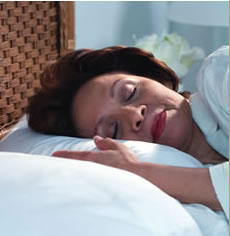
Sleep problems often have two parts: first is the medical portion of your sleep problem; second are problems regarding your sleep environment and sleep habits. These guidelines are called “Sleep Hygiene” and describe how to maintain the proper environment and habits for good sleep.
It is best to avoid reading, watching TV, eating, listening to the radio, etc. in bed. The bed is to be used for sleep and sex only. If not, we can associate the bed with other activities and often it becomes difficult to fall asleep.
Minimize noise, light, and temperature extremes during the sleep period with earplugs, window blinds, or an electric blanket or air conditioner. Research has shown that both noise and light disrupt sleep. If your room is too hot (above 75 degrees) or too cold (below 54 degrees) it can affect sleep as well.
Try not to drink fluids after 8:00 p.m. This may reduce awakenings due to urination.
Nicotine is a stimulant and should be avoided near bedtime and upon awakening at night. Thus, having a smoke before bed, although it feels relaxing, is actually putting a stimulant into your blood stream. WE ARE NOT RECOMMENDING SMOKING BUT IF YOU MUST SMOKE, FOLLOW THESE SUGGESTIONS: cut back before bed, during the 4 hours before bed, smoke fewer cigarettes, and none 30-45 minutes before bed.
Caffeine is also a stimulant and should be discontinued 4-6 hours before bedtime. Caffeine is in coffee (100-200 mgs), soda (50-75 mgs), iced tea, chocolate, and various over the counter medications. Caffeine stays in your system for up to 12 hours!!! Try not to have any past lunchtime, and decaffeinated coffee after dinner. BE CAREFUL if you consume large amounts of caffeine not to cut yourself off too quickly. YOU MAY GET HEADACHES, which of course will keep you awake. Wean yourself off caffeine gradually.
Alcohol is a depressant; although it may help you fall asleep, it causes awakenings later in the night. As alcohol wears off, your body goes into withdrawal from the alcohol causing nighttime awakenings, and sometimes nightmares. Excessive alcohol use can lead to dependence and the withdrawal from alcohol dependence leads to poor sleep.
A light snack may be sleep inducing, but a heavy meal too close to bedtime interferes with sleep. Stay away from protein and stick to carbohydrates, or dairy products. Milk contains the amino acid L-Tryptophan that has been reported to help people feel sleepy. Milk and cookies or crackers (without chocolate) may be useful and taste good as well.
Some studies have shown that exercise right before bed is not as bad as was once thought, unless you are the type of person who becomes more alert with exercise. If so, then get your exercise done at least two hours before bedtime.
